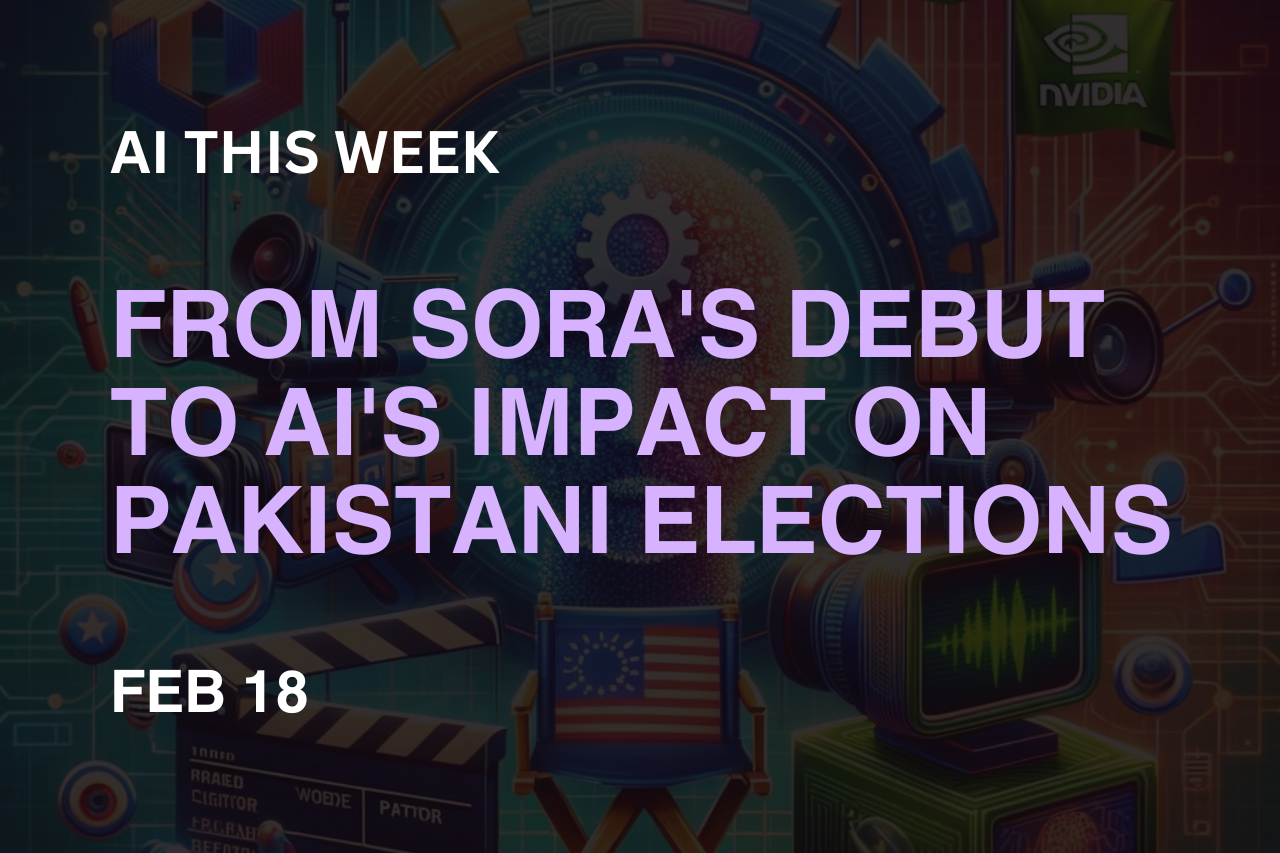
AI This Week: From Sora’s Debut to AI’s Impact on Pakistani Elections – Discover the Latest Innovations and Trends
Welcome back to our latest edition of “AI This Week,” where we continue to explore the ever-evolving landscape of artificial intelligence. This week, we’re spotlighting some groundbreaking developments that are set to redefine the boundaries of AI.
Leading the charge is OpenAI’s Sora, a revolutionary text-to-video model that’s capturing the imagination of tech enthusiasts worldwide. Meanwhile, in the political arena, AI has played a pivotal role in Pakistan’s elections, showcasing the technology’s growing influence in shaping democratic processes.
Additionally, we’ll delve into Nvidia’s unveiling of Eos, its fastest enterprise AI supercomputer, and explore the innovative monetization opportunities offered by ElevenLabs for voice actors in the AI space. Join us as we navigate these exciting advancements and their implications for the future of AI.
Innovations in AI Technology and Interaction
Brilliant Labs Unveils Frame Smart Glasses with AI Superpowers
Brilliant Labs has launched its innovative Frame smart glasses, available for $349, equipped with remarkable “AI superpowers.” These open-source glasses provide features like AI-powered translations, web searches, and visual analyses right before your eyes.
Users can control them using voice commands to identify landmarks, look up items, and get nutritional information through the lens overlay. The Frame glasses come in three colors: black, gray, and clear, with prescription lenses available for an additional $99.
They connect with the Noa app, offering OpenAI’s visual analysis and Whisper’s translation services. With a display of 640 x 400 pixels, a camera resolution of 1280 x 720, and a Lua-based operating system, the Frame glasses are a standout in the smart eyewear market.
ChatGPT Gets an Upgrade with Memory Feature
Have you ever felt trapped in a loop of reintroducing yourself to ChatGPT? OpenAI has come to the rescue by giving ChatGPT a memory. This beta feature allows ChatGPT to retain and recall details from past interactions, eliminating the need to start afresh in each conversation.
Users can either instruct ChatGPT to remember specific information or let it autonomously store relevant details. For instance, inform ChatGPT about your gluten-free bakery, and it will suggest gluten-free brownie recipes.
Or, request bullet-pointed meeting summaries with bold headers, and ChatGPT will consistently format future recaps accordingly. OpenAI has also incorporated options for users to manage the stored memories, ensuring privacy and control.
Nvidia’s Chat with RTX: A New Way to Interact with Your Files
Nvidia introduces “Chat with RTX,” a groundbreaking tool that transforms how you interact with your files. This 35GB download, free of charge, employs Retrieval Augmented Generation (RAG) technology, combining cutting-edge language models like Llama 2 and Mistral to turn your documents, notes, PDFs, and even YouTube transcripts into a personalized AI chatbot.
You can ask questions in natural language and receive responses tailored to your own data. For added privacy, “Chat with RTX” processes all information locally on your Windows RTX machine, requiring an RTX 30 series GPU and 16GB of RAM.
Apple’s Keyframer: AI-Powered Tool for Animation Code Generation
Apple has introduced Keyframer, an AI-powered tool designed to generate animation code from static images and natural language instructions. Based on large language models, possibly GPT-4, Keyframer enables users to describe desired movements, such as “Make the clouds drift slowly to the left,” and then generates the corresponding CSS animation code.
The tool offers users the ability to iteratively refine their animations through additional prompts or direct code modifications. This research demonstrates how large language models can be applied to animation, emphasizing the importance of user feedback and the preservation of creative control throughout the process.
Google DeepMind Develops Grandmaster-Level Chess AI
Google DeepMind has created a chess AI that has reached grandmaster-level status, utilizing a language model architecture. This AI employs a Transformer framework to deviate from traditional search algorithms and has been trained on a vast dataset of 10 million chess games through supervised learning.
As a result, it has achieved a remarkable grandmaster-level Elo rating of 2895 in rapid chess matches against human opponents. Surpassing AlphaZero without relying on conventional search strategies, this model demonstrates the remarkable capabilities of large language models, proving their adaptability beyond the realm of language to include strategic domains like chess.
Microsoft’s AI-Powered Image Upscaling for Windows 11 Games
Microsoft is reportedly working on “Automatic Super Resolution,” an AI-based image upscaling tool for Windows 11 gaming. Discovered by a user on the X platform within the beta OS, this tool is inspired by Nvidia’s DLSS technology and could significantly improve frame rates and visual details in games.
Unlike DLSS, which uses AI neural networks trained on high-resolution images to enhance details in lower-resolution game renders, it’s uncertain if Microsoft’s upscaling requires specific hardware. The hardware prerequisites for this feature are yet to be disclosed.
Nvidia CEO Dismisses Need for Multi-Trillion Dollar AI Chip Initiative
Nvidia’s CEO Jensen Huang counters OpenAI’s Sam Altman, questioning the necessity of a multi-trillion dollar AI chip project. Huang argues that advancements in processor efficiency will render such investments redundant. Nvidia’s CUDA architecture is hailed as the cornerstone of AI development, offering unparalleled flexibility and access for researchers.
Huang acknowledges the GPU’s pivotal role in the AI competition and hints at increasing rivalry. Despite U.S. export restrictions, Nvidia aims to dominate the Chinese market with modified GPUs, while cautioning about the emergence of local Chinese AI chip manufacturers.
Cohere for AI’s Aya: An Open-Source Multilingual Large Language Model
Cohere for AI introduces Aya, a groundbreaking open-source multilingual large language model (LLM) that surpasses existing models in language coverage. Aya can process instructions in over 100 languages, thanks to fine-tuning on a diverse dataset of prompt/completion pairs, including less-represented languages like Azerbaijani and Welsh.
The dataset’s creation involved machine translation and human refinement for cultural accuracy. Aya sets a new standard for open-source multilingual LLMs, paving the way for advancements in language research, preservation, and inclusion in AI.
XPeng Motors Develops “Anything in Any Scene” AI Framework
XPeng Motors has unveiled an innovative AI framework named “Anything in Any Scene,” capable of inserting objects into videos with remarkable photorealism. The framework pays meticulous attention to details such as lighting, shadows, and occlusion, ensuring a seamless integration of added objects with the original footage.
This technology holds promise for applications in film production and autonomous vehicle training, where accurate simulation of diverse scenarios is essential.
Microsoft’s UFO: An AI System to Revolutionize Windows Interfaces
Microsoft has created a groundbreaking AI system called UFO (UI-Focused Agent), poised to transform traditional Windows interfaces. Powered by OpenAI’s image recognition model, UFO comprehends on-screen content and navigates apps to execute tasks.
In testing, UFO successfully completed 86% of complex tasks more efficiently and securely than its rivals. Microsoft plans to enhance UFO further, potentially redefining our interaction with computers.
Nvidia Unveils Eos: Its Fastest Enterprise AI Supercomputer
Nvidia has introduced Eos, its latest and fastest enterprise AI supercomputer, securing the 9th spot globally in FP64 performance. Designed specifically for cutting-edge AI development and scalability, Eos incorporates 576 DGX H100 systems, combining 4,608 Nvidia H100 GPUs with 1,152 Intel Xeon Platinum 8480C CPUs.
This powerful setup, coupled with Nvidia’s Quantum-2 InfiniBand featuring In-Network Computing (400Gb/s), delivers remarkable performance metrics: 121.4 FP64 PetaFLOPS (Rmax) and 18.4 FP8 ExaFLOPS for AI workloads.
Eos is equipped with a comprehensive software stack tailored for AI development, deployment, and orchestration, catering to a wide range of applications from generative AI to extensive model training.
AI in Business and Cloud Computing
AI Companies Push Back Against Copyright Infringement Claims
AI enterprises Stability, Midjourney, Runway, and DeviantArt present persuasive arguments for dismissing a class-action lawsuit by artists alleging copyright infringement in AI model training. These companies maintain that their AI models generate entirely new creations, arguing that artists haven’t demonstrated direct replication by third parties.
DeviantArt, asserting it doesn’t produce AI, disputes its inclusion in the lawsuit. Runway refutes allegations of storing copies, highlighting restricted access, while Stability argues that its AI models do not violate copyright laws.
Google One Surpasses 100 Million Subscribers with AI Premium Plan
Google CEO Sundar Pichai announced that Google One’s subscriber count has exceeded 100 million, coinciding with the introduction of the AI Premium Plan. At $19.99 monthly, this plan offers enhanced features driven by Google’s Gemini AI model, such as Gemini Advanced, with future integration into Gmail and Docs.
Google One also provides Basic, Standard, and Premium plans priced between $1.99 and $9.99 monthly, reflecting Google’s dedication to enriching user experiences with AI innovations and broadening its subscription services.
Nvidia Launches Division for Customized AI Chips
Nvidia is set to establish a new division focused on creating custom chips, including sophisticated AI processors, for cloud computing firms.
As confirmed by nine sources, Nvidia aims to capitalize on the burgeoning market for tailor-made AI chips while safeguarding its leading position in the high-end AI chip sector, which stands at 80%. With key clients like OpenAI, Microsoft, Alphabet, and Meta Platforms increasingly developing their own chips, Nvidia is formulating a strategic response.
Perplexity AI Partners with Vercel for AI Search Integration
Perplexity AI has teamed up with the web development platform Vercel to broaden the reach of its AI search and discovery engine. Through this partnership, developers utilizing Vercel can incorporate Perplexity’s large language models into their applications, enhancing knowledge support.
This collaboration underscores Perplexity’s ambition to become a prominent force in the AI industry. Vercel, previously known as ZEIT, offers cloud platform services that enable developers to construct, deploy, and host web applications, including AI-focused ones like recommendation systems and chatbots.
Microsoft’s Copilot: An AI-Infused Future for Windows 11
Microsoft provides a sneak peek into the AI-driven future of Windows 11, showcasing its Copilot feature’s evolution. Recent tests reveal a dynamic Copilot animation in the taskbar that responds when users copy text or images. This update includes an icon that transforms and signals Copilot’s readiness to assist.
A hover-over menu offers actions like text summarization. Microsoft aims to establish Copilot as a key AI brand, contributing to its vision of an AI-centric PC environment. While details are scarce, 2024 is anticipated to be the “year of the AI PC.”
ElevenLabs Offers Monetization for AI Voice Replicas
ElevenLabs introduces a novel opportunity for actors to monetize their voices by creating high-quality AI replicas. Participants can earn rewards each time their voice is utilized in the Voice Library, with the ability to set rates and manage usage.
For standout talent, ElevenLabs presents licensing agreements that include upfront payments and enhanced visibility as a featured voice on the platform.
AI’s Impact on Society and Politics
AI Campaigns for Jailed Former Pakistani Prime Minister
Imprisoned but not silenced, former Pakistani Prime Minister Imran Khan has turned to AI for his electoral campaign. Despite being behind bars, his party, Pakistan Tehreek-e-Insaf, shocked the nation by winning the election, deemed one of the least credible in Pakistan’s 76-year history.
AI-generated videos of Khan’s speeches garnered millions of views, maintaining voter engagement. Beyond AI, social media played a crucial role in the campaign, especially during the pre-election crackdown.
The New York Times highlighted the unexpected victory as a moment of political upheaval. This event illustrates AI’s potential to impact politics positively, amidst growing concerns about its influence.
Big US Companies Use AI to Monitor Employee Messages
Major US corporations, including Starbucks, Walmart, and Delta, are leveraging AI to monitor employee communications, a CNBC report reveals. These companies utilize an AI-powered tool called Aware, which extracts anonymized data from platforms such as Slack and Zoom to gauge employee sentiment.
Aware’s objective is to identify and address undesirable behaviors like bullying and harassment, flagging individual users in extreme cases. While the intentions behind this surveillance are to promote a positive work environment, it raises questions about privacy and the extent of corporate oversight, echoing Orwellian themes of control and surveillance.
Protesters Rally Against OpenAI’s Pentagon Contract
Protesters gathered outside OpenAI’s offices, voicing their opposition to the organization’s contract with the Pentagon and calling for a cessation of all work on artificial general intelligence (AGI). Organized by groups Pause AI and No AGI, the protest was sparked by OpenAI’s recent policy change regarding military AI use.
The demonstrators expressed concerns that AGI could surpass human intelligence, potentially leading to societal disruption and psychological harm.
Pause AI advocates for a global pause on AGI development until its safety is assured, while No AGI opposes the creation of AGI altogether, highlighting the ethical and existential debates surrounding advanced AI technologies.
Penn Engineering Launches Undergraduate AI Degree
Penn Engineering makes history as the first Ivy League institution to offer an undergraduate degree in Artificial Intelligence (AI). Backed by Raj and Neera Singh, this groundbreaking program aims to cultivate innovative AI leaders equipped to responsibly harness AI’s potential.
The curriculum immerses students in machine learning, computing algorithms, data analytics, and advanced robotics, equipping them to develop AI solutions that transform various sectors. The program boasts distinguished faculty and leverages the state-of-the-art facilities of Penn’s data science hub, Amy Gutmann Hall.
AI in the Stock Market and Business Strategies
Nvidia’s AI Chip Business Drives Stock Surge
Nvidia, once known primarily for its graphics cards for PC video games, has seen a meteoric rise in its stock price, driven by its AI chip business. From a low of almost $50 in 2020 to an all-time high of almost $750, Nvidia briefly became the fourth most valuable company in the US.
The company’s high-end H100 graphics processing units (GPUs), which power some of the world’s most advanced AI models and applications like ChatGPT and GPT-4, have been instrumental in this growth. This surge in Nvidia’s value highlights the transformative impact of AI on the tech industry, with Nvidia at the forefront of this revolution.
AI in Sports, Marketing, and Media
NFL and Amazon Partner for AI-Driven Player Safety
The NFL is embracing AI as a game-changer, teaming up with Amazon to enhance player safety. Together, they’re developing a “Digital Athlete,” a virtual model of an NFL player, to improve injury prediction and prevention by analyzing actions during training and games.
But it’s not just football where AI is making an impact. Major League Baseball’s Statcast, an AI-powered tool, utilizes 15 million data points to give fans and teams a deeper understanding of player performance.
Meanwhile, the NBA’s Milwaukee Bucks are leveraging AI to boost their marketing strategies and engage with fans, even introducing an AI chatbot named Emma to address fan inquiries.
AI Becomes Deeply Embedded in Marketing Teams
A report by Instapage reveals that AI is increasingly integral to marketing workflows, with nearly 96% of surveyed marketers using AI daily.
About 47% of these marketers claim AI saves them at least three hours of work each day and 55.1% report that AI-powered tools are deeply ingrained in their daily routines. This widespread adoption underscores AI’s growing influence in optimizing marketing strategies and enhancing productivity across various industries.
OpenAI’s Sora: AI-Generated Video Becomes Reality
OpenAI, known for innovations like ChatGPT and DALL-E, has once again outdone itself with the announcement of Sora, a groundbreaking text-to-video model. Named after the Japanese word for “sky,” Sora marks OpenAI’s entry into AI-generated video, capable of crafting realistic and imaginative scenes from text instructions.
The model’s ability to generate complex scenes with multiple characters and emotions hints at Hollywood-level quality. Although Sora’s public release awaits thorough vulnerability analysis, it’s poised to revolutionize content creation, potentially becoming part of ChatGPT for generating videos through simple prompts.
This achievement highlights the rapid advancements in AI, bringing us closer to producing AI-generated footage with cinematic quality.
Conclusion
As we wrap up this week’s AI insights, we’ve witnessed remarkable strides in AI technology and its integration into various sectors. From Nvidia’s stock surge driven by its AI chip business to the launch of the first Ivy League undergraduate AI degree at Penn Engineering, the momentum of AI innovation shows no signs of slowing down.
These developments not only highlight the rapid progress in AI capabilities but also underscore the importance of responsible AI leadership and education. As we look forward to the next wave of AI advancements, it’s clear that the potential for AI to transform our world is boundless. Stay tuned for more updates as we continue to track the pulse of AI’s ever-expanding frontier.



